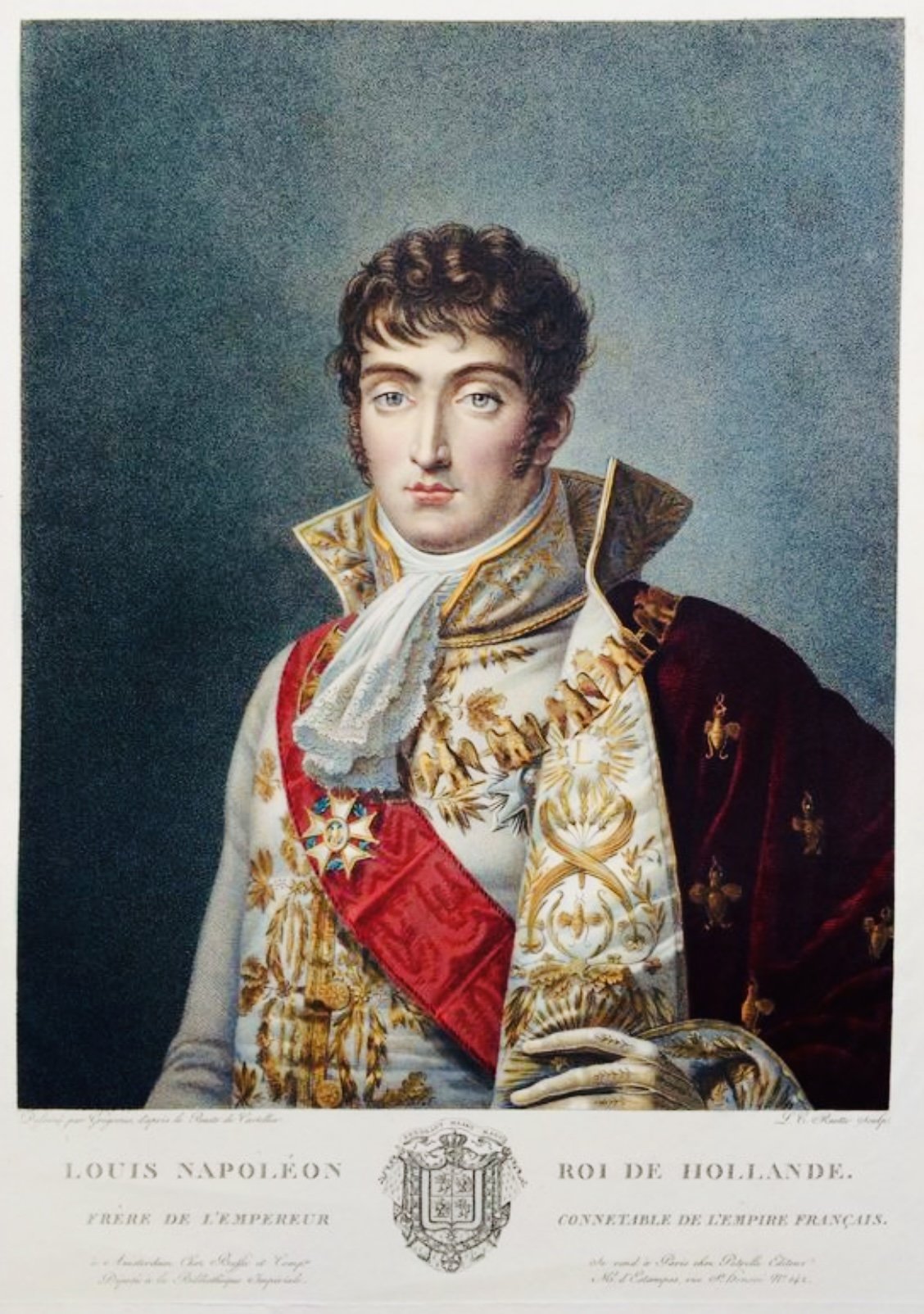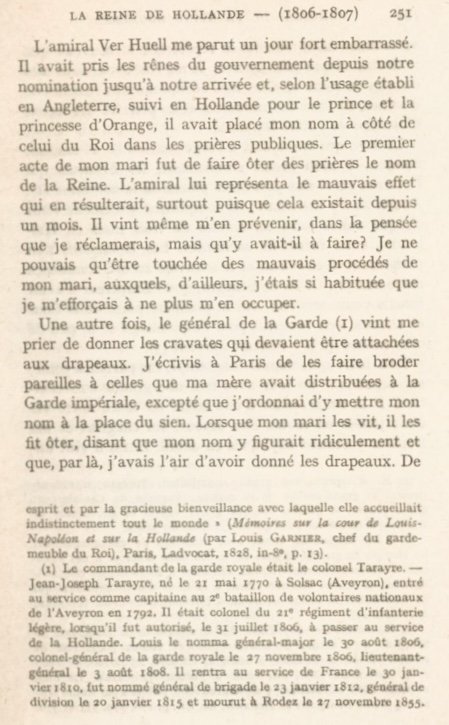Let’s have another look at Hortense’s Memoirs. If you want to read the book it is available for free at the side bar in English and French. Use the widget on the sidebar to translate the text below into pretty much any language.
In this excerpt, Hortense becomes even more enslaved by Louis’ controlling and jealous personality. He demands a relationship “reset” although he doesn’t offer to behave better. This is a typical dynamic in abusive couples. Establishing and maintaining distance is the only protection a victim has for saving oneself from chronic abuse. Complying with abuse only emboldens the abuser and then the abuse increases.
Hortense’s memoirs continues:
My husband, my children and I finally left Saint-Leu on the evening of June 15, 1806. My eldest son slept all night on my knees, the other boy on those of his governess. My husband and I, absorbed in our own thoughts and without saying a word to one another, probably both suffered from the fact that we were unable to share our common grief or seek consolation from the person whom sacred ties should have rendered dear to us.
Each looked upon Destiny as his only friend. I shall not describe our journey in detail. The martial escorts, the honors, receptions and speeches only wearied me. I wrote my mother from the Château of Laeken near Brussels, and I wrote the Emperor from Antwerp asking him to pardon a prisoner who had been sentenced.
Now came the most painful moment of all, that instant when I was obliged to leave our French escort and when I caught sight of the Dutch authorities waiting for us on the other side of the frontier. Change one's nationality! Become something else than French! Sorrowfully I cast my eyes back to the land where I had been born. Should I ever see it again? Should I ever again meet my friends? Should they not forget me? At that moment I felt as though I were doomed to remain forever a stranger, both to those I now left behind me, and to those who were about to adopt me. I found myself cut off from everything and everybody absolutely, by a separation comparable with that which makes death so dreadful to us.
My throbbing heart prevented my replying to the speech with which the Dutch authorities greeted me. My husband did so for both of us. However deep his own grief seemed, he knew how to reply to complimentary phrases and did so all along the way. We stopped at the Palais du Bois near the Hague and made our entry there a few days later. I have always been so anxious to reassure and place at their ease those whom my presence might intimidate that the art of receiving guests and visitors came to me naturally.
For instance, at a reception where four hundred women were presented to me, I found something to say to each one. One day Admiral Ver Huell appeared to me to be much embarrassed. He had assumed the reins of office during the time between our appointment and our arrival and, in accordance with the English custom which was followed in Holland for the Prince and Princess of Orange, he had placed my name beside that of the King in the public prayers.
The first act of my husband was to remove the name of the Queen. The Admiral pointed out the bad impression this would make, especially as the custom had been in force for a month. He even came to tell me about it, thinking that I would protest. But what was there to be done? I could not help feeling hurt at this discourtesy on the part of my husband, although I should have been so accustomed to it as not to notice it any longer.
Another time the general commanding the royal guard came to ask me to tie the new ribbons to the regimental colors. I wrote to Paris for ribbons embroidered like those which my mother had distributed to the Imperial guard but with my name instead of hers on them, When my husband saw the ribbons he had them taken off, saying that my name was ridiculously prominent, and that it looked as though it were I who had presented the flags.
Such annoying incidents occurred so frequently that I sought to efface myself more and more. I limited my activities to my maternal duties and to my customary occupations such as painting, writing songs and taking history lessons from the Abbé Bertrand. Much to my astonishment the King, who was organizing his official household, filled the most important posts with Frenchmen chosen from among those who had followed him to Holland.
None of them expected as much. They had thought they would only spend three months each year at our court on special missions from France. They were delighted. The Dutch very properly protested against this proceeding, and misunderstandings between the two parties arose.
Monsieur de Senegra, whom the Emperor had never been willing to receive, obtained the most prominent position [that of general inspector and head of the navy department]. Everyone had cause to complain against his spying and his frequent lack of manners. Although my husband had not spoken to me for some time, one day we had a long conversation.
He first sent me a letter reviewing the entire history of our married life. His affection for me, his regrets and my coldness toward him were all described in detail. Later he came in person to beg for a reconciliation. "Stop," I said. "I no longer consent to such a thing. My sorrows have been too great. I have been spared nothing, neither your unjust suspicions nor your scandalous investigations into my conduct. I have forgiven you, but so much pain has inevitably altered my feelings toward you. Change your conduct, and my sentiments toward you will change also. I shall not try to give you a false impression, but you must make me forget the past, make me care for you again, and this requires time. It cannot be done at once."
He became angry, shed a few tears and told me that he did not believe in woman's virtue, that I had been unhappy and had certainly sought to console myself.
“True," I replied, "and I had one consolation at least of which you could not deprive me, the knowledge I did not deserve the treatment you inflicted on me."
My husband left me without having uttered a word of affection or of regret.
Our entry into Rotterdam was remarkable for the enthusiasm of the spectators. It is the same thing everywhere; people love a change and expect what is new will be an improvement. My only sensation was one of fear when I felt myself carried along by a mob that seemed to have gone mad.
In spite of our efforts we had not been able to prevent the crowd from unharnessing our horses and drawing our carriage along by hand. This explosive joy so similar to furious rage froze me with terror. My nerves were too weak to bear the sight, and every moment I imagined someone was being crushed beneath our wheels.
“Alas!" I said to my husband as I remembered tales I had heard from Madame Campan, "these are receptions such as were held in France to celebrate the arrival of Marie Antoinette. Later the mob sacrificed her with equal enthusiasm."
It was not the moment to indulge in such painful memories. My state of mind affected everything I saw. Nevertheless, I witnessed one spectacle that was truly an imposing one----the launching of a magnificent man-of-war. This is a ceremony so impressive that it appeals strongly to the imagination.
The original French is available below:













